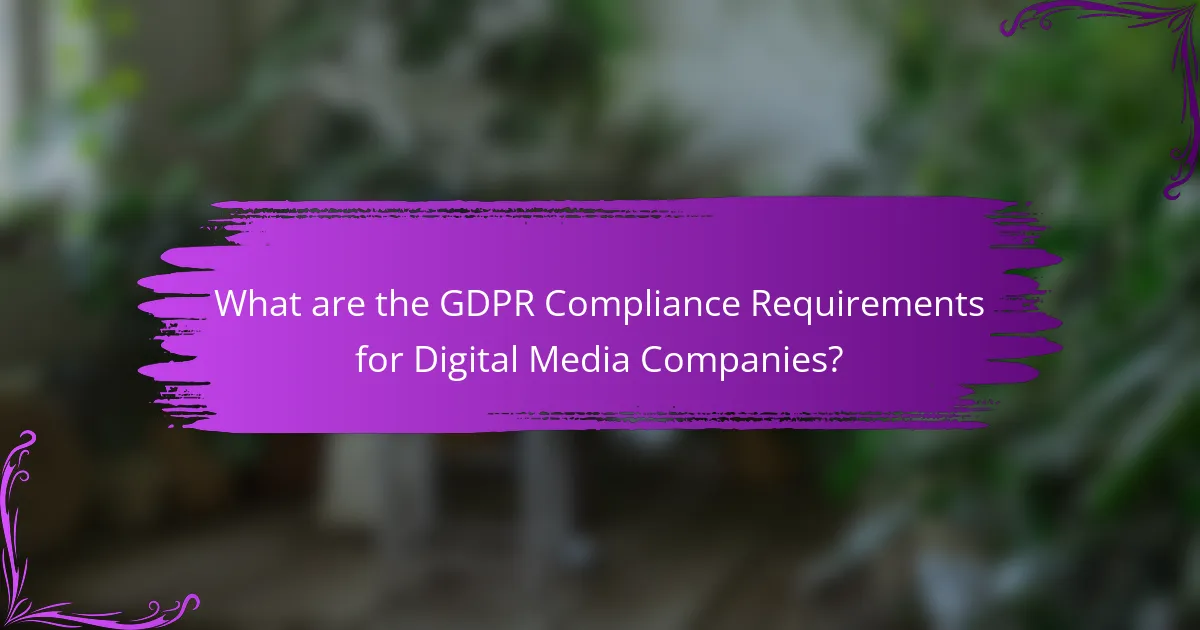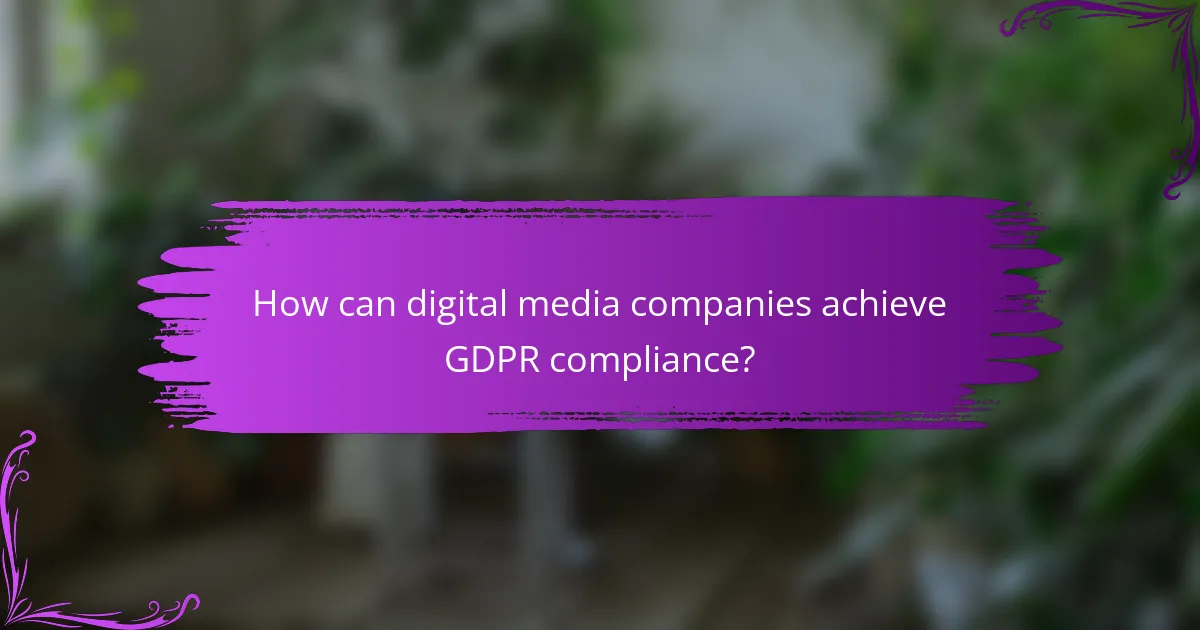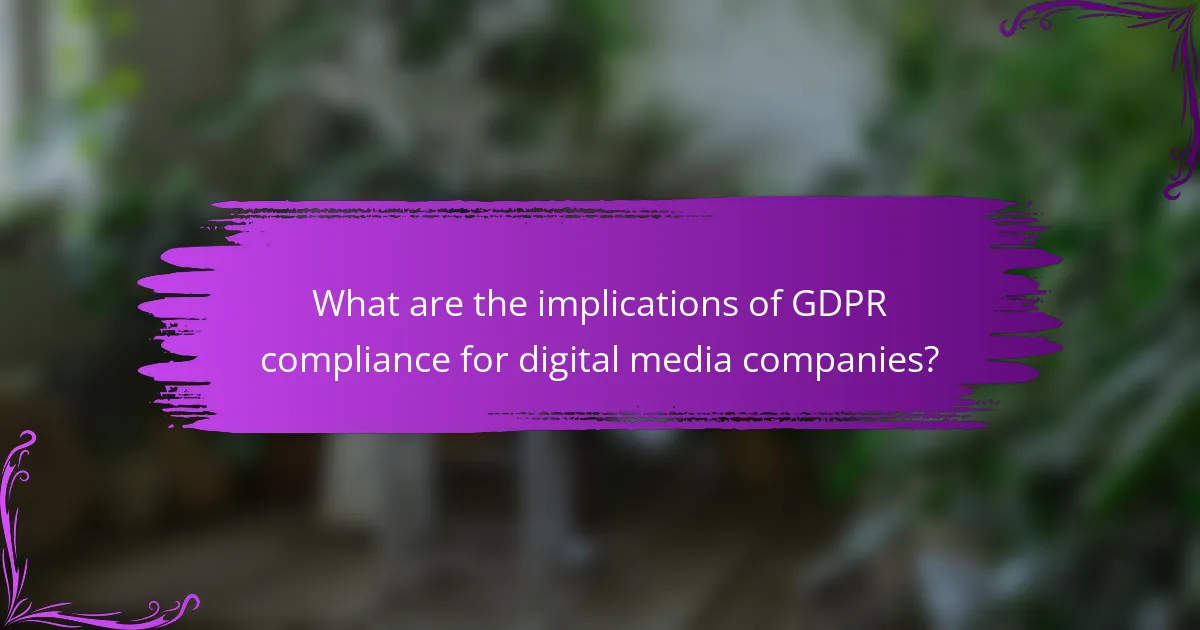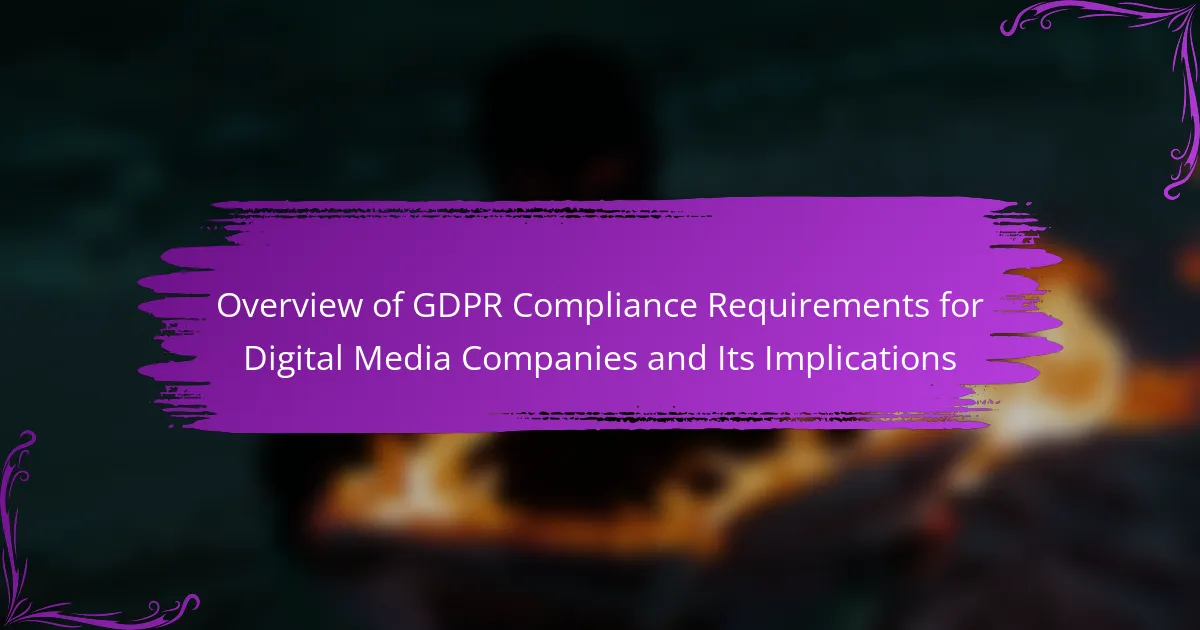
What are the GDPR Compliance Requirements for Digital Media Companies?
Digital media companies must adhere to several GDPR compliance requirements. They must ensure transparency by informing users about data collection and processing. Consent must be obtained from users before collecting personal data. Users have the right to access their data and request corrections. Data minimization is essential; only necessary data should be collected. Companies must implement data protection by design and by default. They are required to appoint a Data Protection Officer if their operations involve large-scale data processing. Additionally, companies must report data breaches within 72 hours. Non-compliance can result in significant fines, up to 4% of global annual turnover or €20 million, whichever is greater.
How does GDPR impact data handling practices in digital media?
GDPR significantly impacts data handling practices in digital media by enforcing strict regulations on personal data usage. It mandates that companies obtain explicit consent from users before collecting their data. This regulation ensures transparency in how data is processed and stored. GDPR also grants users rights to access, rectify, and delete their personal information. Non-compliance can result in hefty fines, reaching up to 4% of a company’s global revenue. Digital media companies must implement robust data protection measures to comply with these requirements. They need to conduct regular audits and train staff on data privacy practices. GDPR has transformed how digital media entities approach user data, prioritizing privacy and security.
What are the key principles of GDPR relevant to digital media?
The key principles of GDPR relevant to digital media include data protection by design and by default, accountability, and transparency. Data protection by design requires integrating data protection measures into the development of digital media products. This ensures that privacy is prioritized from the outset. Data protection by default mandates that only necessary personal data is processed. This limits data collection to what is essential for the specific purpose.
Accountability requires digital media companies to demonstrate compliance with GDPR. Companies must maintain records and be able to show how they adhere to the regulations. Transparency involves informing users about how their data is collected, used, and stored. Clear privacy notices must be provided to ensure users understand their rights.
These principles are foundational to GDPR and are crucial for digital media companies to follow. They help protect user privacy and foster trust in digital services.
How do these principles affect user consent and data processing?
The principles of GDPR significantly impact user consent and data processing. GDPR mandates that consent must be freely given, specific, informed, and unambiguous. This means users must actively opt-in to data processing activities. Companies must provide clear information about how data will be used. Users have the right to withdraw consent at any time. This ensures ongoing control over personal data. GDPR also requires that consent records be maintained for accountability. Non-compliance can lead to substantial fines, emphasizing the importance of adhering to these principles.
What specific obligations do digital media companies have under GDPR?
Digital media companies have several specific obligations under GDPR. They must ensure lawful processing of personal data. This includes obtaining explicit consent from users before data collection. Companies must also provide clear information about data usage. Users have the right to access their data and request corrections. Additionally, companies must implement data protection by design and by default. They are required to report data breaches within 72 hours. Companies must appoint a Data Protection Officer if their core activities involve large-scale processing. Lastly, they must conduct Data Protection Impact Assessments for high-risk processing activities. These obligations are outlined in the GDPR text, specifically Articles 5, 6, 12-14, 25, 33, and 37.
How must companies ensure transparency in data collection?
Companies must ensure transparency in data collection by clearly informing users about data practices. This includes outlining what data is collected, how it is used, and who it is shared with. Companies should provide accessible privacy policies that are easy to understand. Regular updates to these policies are necessary to reflect any changes in data practices. Consent mechanisms must be implemented, allowing users to opt-in to data collection. Additionally, companies should offer users the ability to access, correct, or delete their data. Transparency can be further enhanced by providing contact information for data inquiries. According to GDPR Article 12, companies are required to communicate information about data processing in a concise and transparent manner.
What are the requirements for data breach notification?
Data breach notification requirements under GDPR mandate that organizations inform affected individuals and authorities about a data breach. Notifications must occur within 72 hours of becoming aware of the breach. The notification should include the nature of the breach, the categories and number of affected individuals, and potential consequences. Organizations must also describe measures taken to mitigate risks. If the breach poses a high risk to individuals, direct communication to those affected is necessary. These requirements aim to ensure transparency and protect individuals’ rights. Compliance with these regulations is crucial for avoiding penalties and maintaining trust.
What penalties can digital media companies face for non-compliance?
Digital media companies can face significant penalties for non-compliance with GDPR. Fines can reach up to €20 million or 4% of the company’s global annual turnover, whichever is higher. Non-compliance may also lead to legal actions from affected individuals or regulatory authorities. Additionally, companies may be required to implement corrective measures, which can incur further costs. In some cases, non-compliance can result in reputational damage, affecting customer trust and business relationships. These penalties are enforced to ensure the protection of personal data and uphold privacy rights.
How are fines calculated under GDPR?
Fines under GDPR are calculated based on the severity of the violation. The regulation outlines two tiers of fines. The first tier can reach up to €10 million or 2% of the global annual turnover, whichever is higher. The second tier can go up to €20 million or 4% of the global annual turnover, whichever is higher. Factors influencing the fine include the nature of the infringement, the duration, and the number of affected individuals. Additionally, the intent and negligence of the organization are considered. The European Data Protection Board provides guidelines for enforcement. These criteria ensure fines are proportional to the breach’s impact.
What are examples of non-compliance cases in the digital media sector?
Examples of non-compliance cases in the digital media sector include the misuse of personal data and failure to obtain user consent. A notable case involved Facebook, which faced fines for not properly handling user data. In 2019, the Information Commissioner’s Office in the UK fined British Airways for a data breach that exposed personal information of 500,000 customers. Similarly, Google was fined by French authorities for not being transparent about data collection practices. These instances highlight the importance of adhering to GDPR requirements. Non-compliance can result in significant financial penalties and damage to brand reputation.

How can digital media companies achieve GDPR compliance?
Digital media companies can achieve GDPR compliance by implementing several key measures. First, they must conduct a data audit to identify what personal data they collect and process. Second, they need to obtain explicit consent from users before collecting their data. This consent must be clear, informed, and revocable. Third, companies should ensure that data processing agreements are in place with third-party vendors. This ensures that all parties involved comply with GDPR standards.
Additionally, companies should implement data protection by design and by default. This means integrating data protection measures into their systems and processes from the outset. They must also appoint a Data Protection Officer (DPO) if required, to oversee compliance efforts. Regular training for employees on GDPR requirements is crucial for maintaining compliance.
Finally, companies need to establish procedures for data breach notifications. Under GDPR, they must notify the relevant authorities within 72 hours of becoming aware of a data breach. By following these steps, digital media companies can effectively work towards GDPR compliance.
What steps should companies take to audit their data practices?
Companies should follow a structured approach to audit their data practices. First, they must identify all data sources and types of personal data collected. Next, they should assess the legal basis for data processing in compliance with GDPR. Companies must also review data retention policies to ensure they align with GDPR requirements. Furthermore, they should evaluate data sharing practices with third parties. It is essential to document all data processing activities in a Record of Processing Activities (RoPA). Regular training for employees on data protection principles is also crucial. Finally, companies should implement a process for ongoing monitoring and review of data practices to adapt to any regulatory changes.
How can companies assess their current compliance status?
Companies can assess their current compliance status by conducting a thorough compliance audit. This audit should include reviewing internal policies and procedures against GDPR requirements. Companies must evaluate data processing activities and ensure they align with legal obligations. They should also assess employee training and awareness regarding data protection practices. Regularly updating documentation and records of processing activities is essential for compliance. Engaging with legal counsel or compliance experts can provide additional insights and guidance. This methodical approach helps identify gaps and ensures adherence to GDPR standards.
What tools and resources are available for compliance auditing?
Compliance auditing tools and resources include software solutions, frameworks, and guidelines. Popular software tools are OneTrust, TrustArc, and RSA Archer. These tools help automate compliance processes and manage data privacy. Frameworks like ISO 27001 and NIST provide structured approaches for compliance. Guidelines from regulatory bodies, such as the GDPR itself, offer essential compliance information. Additionally, training resources and certifications from organizations like IAPP enhance compliance knowledge. These tools and resources collectively support organizations in meeting GDPR compliance requirements effectively.
How can digital media companies implement effective data protection measures?
Digital media companies can implement effective data protection measures by adopting robust security protocols. They should encrypt sensitive data to prevent unauthorized access. Regularly updating software and systems helps protect against vulnerabilities. Conducting employee training on data privacy is essential for compliance. Implementing access controls limits data exposure to only necessary personnel. Regular audits and assessments identify potential risks and gaps in security. Additionally, establishing clear data retention policies ensures compliance with GDPR requirements. These strategies collectively enhance data protection and safeguard user information.
What role does employee training play in GDPR compliance?
Employee training is crucial for GDPR compliance. It ensures that employees understand data protection principles and their responsibilities. Training helps staff recognize personal data and the importance of safeguarding it. Regular training sessions promote awareness of GDPR requirements and updates. Informed employees are less likely to commit data breaches. According to the Information Commissioner’s Office, 80% of data breaches are caused by human error. Thus, effective training reduces risks associated with non-compliance. It also fosters a culture of accountability within the organization. Overall, employee training is a foundational element for achieving GDPR compliance in digital media companies.
How can technology assist in maintaining compliance?
Technology assists in maintaining compliance by automating data management processes. Automation reduces human error and ensures consistent application of compliance measures. Compliance software can track data processing activities, making it easier to demonstrate adherence to regulations. Tools like encryption and access controls protect sensitive information, aligning with GDPR requirements. Regular audits facilitated by technology help identify compliance gaps promptly. Additionally, data analytics can provide insights into user consent and data usage, enhancing transparency. These technological solutions collectively support digital media companies in meeting GDPR obligations effectively.
What best practices can ensure ongoing GDPR compliance?
Implementing ongoing GDPR compliance requires adopting best practices. Regularly conducting data audits helps identify personal data usage. Maintaining accurate records of processing activities is essential for transparency. Providing staff training on data protection principles ensures awareness. Establishing clear data subject rights procedures enhances user trust. Utilizing data protection impact assessments mitigates risks in new projects. Regularly reviewing and updating privacy policies keeps them current. Engaging a Data Protection Officer can provide expert guidance on compliance.
How can companies stay updated with GDPR changes?
Companies can stay updated with GDPR changes by regularly monitoring official EU resources. The European Data Protection Board (EDPB) provides updates and guidelines on GDPR. Subscribing to newsletters from legal firms specializing in data protection is beneficial. Attending webinars and conferences focused on GDPR can enhance understanding. Engaging with industry groups and forums allows sharing of best practices. Following relevant news outlets keeps companies informed about legislative changes. Regular training for employees on GDPR compliance ensures awareness of updates. Consulting with data protection officers can provide tailored advice on changes.
What are common pitfalls to avoid in GDPR compliance efforts?
Common pitfalls to avoid in GDPR compliance efforts include inadequate data mapping. Organizations often fail to fully understand what personal data they hold. This can lead to non-compliance with the requirement to provide transparency. Another pitfall is neglecting to establish a lawful basis for processing data. Without this, companies risk violating GDPR principles.
Additionally, many organizations underestimate the importance of user consent. Consent must be clear, informed, and freely given. Failing to obtain valid consent can lead to significant fines. A lack of employee training on GDPR requirements is also a common issue. Employees must be aware of their responsibilities under the regulation.
Finally, companies often overlook the necessity for regular compliance audits. Ongoing assessments are crucial to ensure continued adherence to GDPR. These pitfalls can result in legal challenges and financial penalties. Therefore, addressing them is essential for successful GDPR compliance.

What are the implications of GDPR compliance for digital media companies?
GDPR compliance imposes significant obligations on digital media companies. These companies must ensure data protection and privacy for their users. They are required to obtain explicit consent before processing personal data. This consent must be clear, informed, and easily revocable. Digital media companies must also implement data protection measures, such as encryption and pseudonymization. They are obligated to report data breaches within 72 hours to the relevant authorities. Non-compliance can result in hefty fines, up to 4% of annual global turnover or €20 million, whichever is higher. GDPR compliance also enhances consumer trust, as users are more likely to engage with companies that prioritize their privacy.
How does GDPR compliance affect consumer trust and brand reputation?
GDPR compliance significantly enhances consumer trust and brand reputation. Adhering to GDPR demonstrates a brand’s commitment to protecting personal data. This commitment fosters a sense of security among consumers. A survey by the International Association of Privacy Professionals found that 88% of consumers are more likely to trust companies that prioritize data privacy. Moreover, brands that comply with GDPR are less likely to face legal penalties. Legal issues can severely damage a brand’s reputation. Therefore, compliance not only protects consumers but also strengthens the brand’s public image. Brands seen as trustworthy often enjoy increased customer loyalty and retention.
What impact does transparency have on user engagement?
Transparency significantly enhances user engagement. When users perceive a brand as transparent, they are more likely to trust it. Trust leads to increased user loyalty and interaction. According to a study by Edelman, 81% of consumers need to trust a brand to buy from them. Transparent practices, such as clear data usage policies, foster a sense of security. This security encourages users to engage more frequently with the brand. Additionally, transparent communication can lead to higher satisfaction rates among users. Satisfied users are more likely to share their positive experiences, further driving engagement.
How can compliance enhance customer loyalty?
Compliance enhances customer loyalty by building trust and ensuring data protection. When companies adhere to regulations like GDPR, they demonstrate a commitment to safeguarding customer information. This commitment fosters a sense of security among customers. Studies show that 79% of consumers are more likely to trust brands that prioritize data protection. Compliance also reduces the risk of data breaches, which can severely damage customer relationships. By being transparent about data usage, companies can engage customers more effectively. Overall, compliance creates a positive customer experience that strengthens loyalty.
What are the operational impacts of GDPR compliance on digital media companies?
GDPR compliance significantly impacts the operations of digital media companies. It requires these companies to implement strict data protection measures. Data collection practices must be transparent and explicit. Companies need to obtain clear consent from users for data processing. This shift often leads to changes in marketing strategies. Companies may face increased operational costs due to compliance efforts. Additionally, non-compliance can result in hefty fines, reaching up to 4% of annual global turnover. As a result, many companies invest in training and legal resources to ensure adherence. Overall, GDPR compliance reshapes how digital media companies handle user data and privacy.
How does compliance influence marketing strategies?
Compliance significantly influences marketing strategies by dictating how companies can collect and use consumer data. Under regulations like GDPR, businesses must obtain explicit consent before processing personal information. This requirement alters traditional marketing tactics that relied on broad data usage. Companies must now focus on transparency and consumer trust to build effective campaigns. Data-driven strategies must adapt to prioritize compliance, which can limit targeting options. Marketers may need to invest in new technologies for secure data management. Additionally, non-compliance can lead to severe penalties, impacting brand reputation and financial stability. Therefore, compliance shapes marketing strategies by necessitating a shift towards ethical data practices.
What changes may be needed in data management processes?
Data management processes may need to enhance transparency and user consent mechanisms. This aligns with GDPR requirements for clear data usage policies. Companies should implement stronger data access controls to protect user information. Regular audits and assessments of data handling practices are essential. Staff training on GDPR compliance can improve adherence to regulations. Additionally, organizations may need to establish data retention and deletion protocols. These changes ensure accountability and minimize risks associated with data breaches. Implementing these measures can lead to greater trust from users.
What tips can digital media companies follow to navigate GDPR compliance effectively?
Digital media companies can navigate GDPR compliance effectively by implementing several key strategies. First, they should conduct a thorough data audit. This identifies what personal data they collect and process. Second, companies must ensure transparency with users. Clear privacy notices should explain data usage. Third, obtaining explicit consent is crucial. Users must agree to data collection in a clear manner. Fourth, companies should implement data protection by design and by default. This means integrating privacy measures into their systems from the start. Fifth, establishing a Data Protection Officer (DPO) can help maintain compliance. A DPO oversees data protection strategies and ensures adherence to regulations. Lastly, regular training for employees on GDPR principles is essential. This ensures everyone understands their responsibilities regarding data handling. Following these tips helps mitigate risks and enhance compliance with GDPR.
How can companies create a culture of privacy within their organization?
Companies can create a culture of privacy by implementing comprehensive data protection policies. These policies should clearly outline how personal data is collected, used, and stored. Training employees on privacy best practices is essential. Regular workshops can enhance awareness and compliance. Leadership must demonstrate a commitment to privacy by prioritizing it in decision-making. Establishing a dedicated privacy team can provide ongoing support and oversight. Companies should also conduct regular audits to assess compliance with GDPR requirements. Transparency with customers about data usage fosters trust and accountability.
What resources are available for ongoing GDPR education and support?
Key resources for ongoing GDPR education and support include official guidelines from the European Data Protection Board (EDPB) and national Data Protection Authorities (DPAs). These organizations provide comprehensive materials and updates on GDPR compliance. Online courses from platforms like Coursera and Udemy offer structured learning paths. Additionally, industry-specific webinars and workshops are frequently hosted by legal firms and compliance experts. Professional organizations, such as the International Association of Privacy Professionals (IAPP), also provide resources and certification programs. Networking events and forums facilitate knowledge sharing among GDPR professionals. These resources ensure that individuals and organizations stay informed on GDPR requirements and best practices.
The main entity of the article is GDPR compliance requirements for digital media companies. The article provides a comprehensive overview of the specific obligations these companies must meet under GDPR, including obtaining user consent, ensuring data transparency, and implementing data protection measures. It discusses the implications of compliance on consumer trust, brand reputation, and operational practices, highlighting the importance of accountability and transparency in data handling. Additionally, the article outlines best practices for achieving compliance and the potential penalties for non-compliance, emphasizing the critical role of employee training and robust data management processes.



